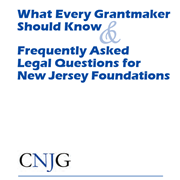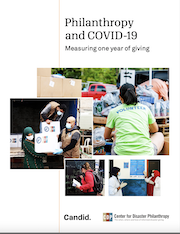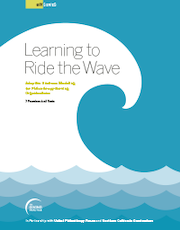Site Search
- resource provided by the Forum Network Knowledgebase.
Search Tip: Search with " " to find exact matches.
The Council of New Jersey Grantmakers has joined with our colleagues at the Center for Nonprofits to support a new, national campaign from GuideStar, Charity Navigator and WiseGiving of the BBB. For too long, there has been a misconception that “less is more” when it comes to administrative and overhead expenses in the nonprofit community. The idea that the “best” organizations are those that spend the least amount possible – in actual dollars or as a percentage of their total budgets – has become so ingrained that it has formed the basis of public policies, rating systems and decision making for many donors. The consequences for charities and communities have been severe and far-reaching, translating into less effective organizations, starved of the strategic resources needed to do their work.

This guide was designed to help the state’s philanthropic community understand their ethical, legal, and fiduciary requirements and obligations.
Learn how you can register for events online, search the member directory for organizations and colleagues who have the same interests, and update your profile.
A $1,000,000 donation from The Pascale Sykes Foundation to the New Jersey Community Capital and the African American Chamber of Commerce of New Jersey was made to support Black-owned businesses with pandemic relief loans from $10,000 to 75,000 and recovery loan sizes in yet-undetermined amounts.
The investment in the Equitable Small Business Initiative, announced Feb. 5, is intended to help Black New Jersey business owners access resources and support to establish, sustain, augment or expand business operations, as well as those businesses economically impacted by the pandemic.
The nonprofit formed a relationship with the AACCNJ after a call to action last spring by The Association of Black Foundation Executives, which advocates for transformative investing in Black communities, a relationship formed between The Pascale Sykes Foundation and the AACCNJ.
“As sole proprietorships and family-run businesses primarily define the Black business community, they often require non-conventional loans and business guidance for sustainable growth,” said President Fran Sykes. “In collaboration with the AACCNJ and NJCC in this capacity, we can directly affect family-owned and -operated businesses, be more inclusive, and positively affect a greater number of people.”
FAQs for Benefit Survey
What is the New Jersey Foundation Benefits & Salary Summary Report?
Developed exclusively for CNJG members, the New Jersey Foundation Benefits & Salary Summary Report presents comprehensive benefits data specific to New Jersey's grantmaking community, alongside data from the Council on Foundations' annual salary survey. The last report, produced in 2017, can be found on our website.
Given increased scrutiny in the areas of compensation and benefits, the need to benchmark this information within the field has become even more important. The 2020 New Jersey Foundation Benefits & Salary Summary Report will make available critical information needed to determine fair compensation and benefits in the state across multiple organizational levels.
Who is eligible to participate in this survey?
To be eligible to participate in the survey, your organization must have at least one PAID (full-time or part-time) employee. The beginning of the survey will help respondents determine if they are eligible to participate. Even if you are NOT eligible to participate, please complete the first four questions of the survey. You will then be directed to the last page of the survey where you will be asked to submit your data. You do not need to be a CNJG member to participate. If you do participate, but are not a CNJG member, you will receive a copy of the report.
Where do I complete the survey?
The survey may be completed here: https://www.surveymonkey.com/r/2020CNJGBenefitsSurvey.
When does the survey need to be completed?
The deadline for submitting completed surveys is August 10, 2020.
I'm not the right person to complete this survey, can I email it to someone else to complete?
You may forward the email that contains the survey link to someone else in your organization. The recipient will be able to click on the survey link to access the survey.
How long will it take to complete the survey?
It is estimated that entering in the data should take around one hour (not including the time it will take to research your organization’s information). If you offer more benefits, it may take more time; if you offer less, the less time it will take to complete. Logic is built into the online survey, enabling you to skip questions or entire sections depending on what your organization offers. CNJG suggests looking through the questions first (available in PDF form) and compiling your answers to then enter in the data all at once online.
How do I submit our information to the survey?
CNJG developed the survey using SurveyMonkey, so that you may enter all of your data online. The prompts at the bottom of each page guide you as you enter your information.
Can I see all of the questions first?
Yes! The survey in its entirety can be found below. Feel free to use this document to gather your benefits data, and then enter the information all at once online at https://www.surveymonkey.com/r/2020CNJGBenefitsSurvey.
For which year/time period should I provide compensation and benefits data?
The Benefits Survey should be based on benefits data for the 2020 calendar year. Please complete the survey questions by indicating the benefits that your organization is currently offering to employees in 2020.
Help! The way that this question is structured is difficult (or impossible) for me to answer.
We understand organizations provide different kinds of benefits and have developed novel benefit packages. And, often, benefit packages differ within an organization. Please complete the survey questions by indicating the benefits that are offered to the majority of employees in your organization, and please use the comment boxes after some of the questions and at the end of the survey to further explain/clarify your responses. Please also note that, while many questions are required (indicated with an asterisk) some questions in the survey are optional and can be skipped.
Once I've started the survey, can I save it and complete it another time?
Yes! You may leave the survey at any time by clicking on "Exit this survey" on the upper right hand corner of the page. Note: if you have just entered a page of data, proceed to the next page before you exit, otherwise the data just entered for the current page will not be saved. To reopen the survey, click on the link in the survey email that was sent to you.
Once I've completed the survey, how do I submit my input?
To submit your input, go to the last page of the survey and click on "Submit Survey." Your input will automatically be submitted.
I clicked on "Submit Survey," but I wasn't finished completing the survey - what should I do?
To make changes in a survey that has already been submitted, please contact Craig Weinrich. It will be possible for you to make changes to your survey input until the survey is officially closed on August 10, 2020.
What topics will be covered?
The following topics will be covered in the survey:
• Survey Eligibility
• Organization Information
• Employment
• Leave Benefits
• Insurance Benefits
• Retirement
• Other Benefits
• Retiree Benefits
• Benefits Cost
Who do I contact if I have questions?
Should you have any questions or need additional information, please contact Craig Weinrich.
CNJG thanks you in advance for your time and assistance with this endeavor. The report that we create becomes an important tool for you to benchmark your salaries and benefits plans for the coming years, so the time and effort will be incredibly valuable to your organization and other CNJG members.
A CNJG member queried the corporate listserve on strategies or resources for virtual volunteering. CNJG compiled these responses, and listed the different opportunities that members are offering for employee volunteerism.
The National Center for Family Philanthropy and Youth Philanthropy Connect, a program of the Frieda C. Fox Foundation, have joined together to bring new resources to the field of philanthropy focused on engaging the next generation of donors and family members. Igniting the Spark: Creating Effective Next Gen Boards is the first publication of its kind, offering a comprehensive overview of the growing practice among family foundations and donor advised fund holders of using next generation boards.
The issue brief outlines creative options for involving children as young as 8 in family philanthropy. It is supplemented by case studies of seven foundations using next gen boards and other approaches for engaging youth in philanthropy. Throughout both resources, the voices of next gen donors describe what works — and what doesn’t — providing family members and staff with guidance and insights new to the field.

As of February 22, 2021, the coronavirus pandemic has claimed the lives of more than 2.5 million people around the world, with an additional 110 million people infected. And while data such as this serves an enormous purpose in understanding the scale and scope of a disaster, aiding experts in determining needs and directing resources, it remains far from the complete picture of the impact of COVID-19 on humanity.
Philanthropy’s response to the COVID-19 pandemic demonstrates that not only can donors be exceedingly generous in a crisis, but they can lead through trust and courage. In this new report, the Center for Disaster Philanthropy and Candid recognize this leadership, as demonstrated by increased overall giving, even if too little of it is in the form of unrestricted grants and funds directed toward Black, Indigenous, and other communities of color. There remains much to be done, especially regarding support for programs that deliver the policy and system changes necessary to redress generations of inequities.

Developed in partnership with United Philanthropy Forum and Northern California Grantmakers, this guide shares seven practices and 12 tools for Philanthropy-Serving Organizations who seek effective ways to mobilize resources to sustain their organization’s work. The guide features perspectives from dozens of leaders of national and regional PSOs and examples from our work with these organizations. Much of the content is based on conversations and strategy work with PSO leaders, staff and board members.
CNJG is pleased to offer this program to family foundation members as part of NCFP's Fundamentals of Family Philanthropy 2024 webinar series, providing guidance on the core tenets of effective family philanthropy.
What responsibilities do family philanthropies have to steward their funds as a public good? Through engaging discussions and real-world case studies, we’ll navigate the complexities of wealth creation and stewardship and ensuring equitable distribution of resources.
Cost: This event is free for CNJG Members who are family foundations.
Other types of foundations are ineligible to join this webinar.
This program is a CNJG membership benefit for family foundation members, including staff and trustees, in partnership with the National Center for Family Philanthropy.
This publication from Grantmakers for Effective Organizations offers a framework for thinking about how to measure progress and results in place-based and community change initiatives.
The Ford Institute for Community Building, a program of The Ford Family Foundation, works to help community leaders learn how to implement local solutions based on principles of effective community building. This paper describes the development and work of the The Ford Institute for Community Building.
Community foundations are beginning to deepen and shift how they work, adopting an anchor mission that seeks to fully deploy all resources to build community wealth. Moving into territory relatively uncharted for community foundations, they are taking up impact investing and economic development — some in advanced ways, others with small steps. This report offers an overview of how 30 representative community foundations — including The Seattle Foundation, the Vermont Community Foundation, and the Greater Cincinnati Foundation — are working toward adopting this new anchor mission.
This Democracy Collaborative report was written by Marjorie Kelly, Senior Fellow and Director of Special Projects and Violeta Duncan, Community Development Associate.
ValuesAdvisor, a nonprofit online platform, helps you find the financial expertise needed to implement a mission-aligned investment strategy. Access to ValuesAdvisor is provided at no cost as a benefit of your membership in CNJG.
ValuesAdvisor offers a searchable database of values-oriented investment advisors, who have been suggested by other trusted affinity groups and philanthropy-supporting organizations. The platform offers a simple and dynamic interface that allows you to filter advisor information on data points such as minimum account size, amount of values-aligned AUM, impact themes, service offerings, asset classes, diversity, and other key information. Note: the platform does not collect user data and is committed to preserving the anonymity of the asset owners who use the platform.
To join, visit the ValuesAdvisor website and enter 'CNJG' at checkout to claim your free access.
To Get Started/Questions:
Kate Simpson, Head of Outreach, ValuesAdvisor
Email: [email protected]
If you have an advisor you’ve worked with who has helped your foundation align your investments with your mission, and believe your peers would benefit from working with, you can suggest them for the ValuesAdvisor platform in their short, “Suggest an Advisor Form.”
For more information, please watch this video or download the infographic below.
